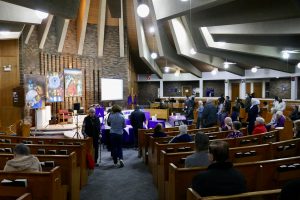HOMILY LENT WEEK 05 03 – Year I
Glory and Praise; Worship and Blessing
(Dan 3:13-95; Dan 3; Jn 8:31-42)
********************************************
Many parishes are familiar with the hymnbook Glory and Praise that came out many years ago.
That title, the psalm response and readings today combine to provide us with a clear message centred on faith: believe in Jesus; listen to his Word then bless, praise and glorify him.
The readings present two opposing struggles to believe. In the first reading from the book of Daniel, the three young men Shadrach, Meshach and Abednego refuse to serve or worship the golden calf as they are ordered by King Nebuchadnezzar. Their steadfast faith is so pure (they refuse even though God might not deliver them) that an angel of God comes and protects them from the flames. It is significant that what they do with the angel in the fiery furnace is sing hymns to God and bless the Lord.
The fidelity of these three to the covenant is in stark contrast to the Israelites in the desert who so quickly worshipped a golden calf when Moses was up the mountain.
The false gods in our lives won’t be golden calves. They are more personal and deceptive – the basic temptations of possessions, prestige and power. The Big Book of Alcoholics Anonymous names them as money, fame and power, and as “self-will run riot.” I have developed them a bit further as possessions/pleasure, prestige/fame, and power/control. These are the things in our lives, the false gods, we are tempted to worship and serve.
Spiritual writer Thomas Keating describes them as basic biological needs of safety and security, affection and attention, power and control. He claims when these are not met in our childhood, they become false programs for happiness that we turn into obsessions (again, false gods) and try to satisfy at all costs.
These temptations and unmet needs when run to the extreme then become addictions, and that is when they become false gods that we worship. We start breaking the first commandment – “Thou shalt have no other gods before me.” The addict is totally focused on satisfying his or her addiction at all cost, and the other family members become totally focused on trying to cope with the addict, usually ending up in codependency and loss of their true selves.
We see a contrasting picture in the gospel – not of believing in a false god, but rather refusing to believe in Jesus as the true Son of God. If the Jewish religious leaders are addicted, it is to a self-serving religion that is rigid, exclusive, judgmental and based on their lust after possession, prestige, power and control. Their sin is unbelief, hypocrisy and stubborn self-righteousness. They resist the truth of who Jesus is, denying miracles they witnessed, and are really slaves to their own false gods, without even realizing it. In that sense, their sin is greater than that of King Nebuchadnezzar, who ends up blessing the God of Shadrach, Meshach and Abednego, and believing in the one true God of Israel.
The best way we can avoid both kinds of sin – worshipping a false god and stubborn self-righteousness – is to place our faith in Jesus; to as he says, make a place for his Word within us, and follow the advice of Daniel to bless, worship and give glory to God.
Faith in the one God has always been a struggle. As we approach Easter, the issue becomes whether Jesus really rose from the dead, or was it just a spiritual event that had religious significance for the followers of Jesus? Ron Rolheiser OMI, in an article on the empty tomb, points out not to believe in a physical resurrection would rob the incarnation of its meaning. Jesus was born in the flesh, lived in the flesh, died in the flesh, and rose in the flesh. And that eon-changing, death-defeating, rising to new life, cosmic-wide event opens up a whole new creation that is truly Good News indeed.

Lenten Mission at St. Matthew’s Parish, Edm.
The participants in the Lenten Missions I conduct in parishes during this time of Lent can attest to that. They believe firmly in Jesus; they are making a place for his Word in their hearts, and express their faith as did the three young men in the furnace by singing hymns of praise and worship to bless God and give God glory as Father, Son and Holy Spirit.
The Eucharist is itself a great act of faith, a listening to God’s Word, and a great prayer of praise, thanksgiving and worship that both blesses God and gives God glory.
So let us take these readings to heart, place our faith totally in Jesus, listen to his Word, and then bless, praise and glorify him not just through song but also with our lives.



